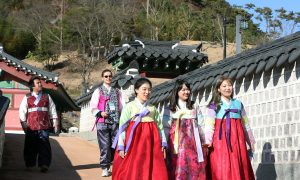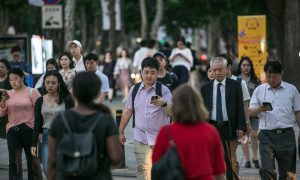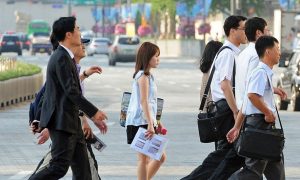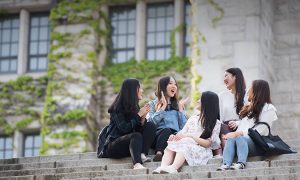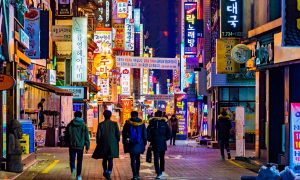
In recent years, South Korea has been recognized for itsHigh-quality education systems, developed economic environments, and lowerimmigrantsfig. knack or trick (esp. scheme get sth cheaper), attracting an increasing number of international students to study abroad. At the same time, many students want to finish their studies with aStaying to work and live and eventually obtaining permanent residence status (F-5 visa). So how do you achieve this through the study abroad routeImmigration to KoreaWhat about it? This article will give you a detailed explanationThe Complete Path from Study Abroad to Permanent Residence, help you realize your dream of moving to Korea!
I. Basic path for studying in Korea
Korea has a very sophisticated higher education system that attracts a large number of international students. Generally speaking, international students can enter Korea to study in the following ways:
1. Language schools (D-4 visas)
- Suitable for students who have no basic knowledge of the Korean language and can learn Korean at a university-affiliated language school in Korea.
- The duration of study is usually6 months to 2 years, which can be used as a stepping stone to a college or graduate program.
- Cannot apply directly for permanent residence, but can transition to a degree program (D-2 visa).
2. Undergraduate/graduate programs (D-2 visa)
- Apply for an undergraduate, master's or doctoral program at a Korean university and receiveD-2 Student VisaThe
- The undergraduate program is usually4 yearsMaster's degree2 yearsDr.3-5 yearsThe
- During the course of the program, you maywork legally(up to 20 hours per week) to relieve financial stress.
- After graduation, you can apply for a job-seeking visa (D-10), enter a work visa (E-7) or start a business to immigrate (D-8).
3. Exchange students/short-term studies (D-2-6 visas)
- For those who are already enrolled in a university in their home country and want to come to Korea forShort-term exchange studiesof students.
- Usually no more than1 yearThe program is suitable for those who want to learn more about Korean life and culture.
- Not suitable for long-term immigration planning, but can be converted to a D-2 visa for further study.
II. Complete Path from International Student to Permanent Residence in Korea
Study abroad itselfIt doesn't lead directly to permanent residence., but you can do so with the following4 Key StepsProgressive realizationStudy Abroad ImmigrationThe
1. Obtaining a degree → applying for a job-seeking visa (D-10)
✅ population (esp. of a group of people): International students who have completed their undergraduate or graduate studies.
✅ Application Requirements: You must obtain a degree from a Korean university and apply for a D-10 visa after graduation.
✅ validity period: Usually6 months, with the possibility of applying for up to two extensions (maximum 2 years)The
During the D-10 visa period, you can:
- Finding a job in Korea and convertingE-7 Work VisaThe
- Apply to start a business and convertD-8 Investment VisaThe
- Apply for a visa for a skilled person or an expert in a specific field.
2. Find a suitable job → Convert E-7 work visa
✅ population (esp. of a group of people): Graduates who have found regular employment through the D-10 visa.
✅ Application Requirements: The company is willing to sponsor and meets the relevant occupational category.
✅ validity period::1-3 years, renewableThe
While holding an E-7 visa, you need to:
- Accumulated 5 years of work in Korea, maintain legal employment status.
- Annual salary up to a certain standard(generally more than 1.5 times the average GNI income in Korea).
- You must not commit a crime during this period, otherwise it will affect your visa renewal and permanent residence application.
3. Conversion of F-2 long-term resident visas (points system)
✅ population (esp. of a group of people): Hold an E-7 visa for at least3 yearsand is in line with Korea's "point system"People who ask for it.
✅ Application Requirements: Points achieved80 points or more(120 total points).
Points Composition:
- Academic qualifications (up to 25 points): 10 points for Korean master's degree and 15 points for doctorate.
- Annual salary (up to 25 points): Extra points for annual salary higher than the Korean GNI average.
- Korean Language Proficiency (up to 20 points): A maximum of 20 points will be added to TOPIK level 6.
- Work experience (up to 25 points): The longer you work legally in Korea, the more points you get.
- Adaptability (up to 15 points): Public service activities, volunteerism, social integration in Korea, etc.
✅ With an F-2 visa, you can enjoy the benefits of Korean residents and change jobs freely.
✅ Over 3 years of cumulative residenceMay applyF-5 Permanent Resident Visa (Green Card)The
4. Application for F-5 Permanent Resident Visa (Green Card)
✅ population (esp. of a group of people): F-2 visa holder3 yearsor E-7 Visa Cumulative5 years of workAbove.
✅ Application Requirements::

- able fulfill (conditions or requirements)stable income, has good social credit.
- clean bill of healthand has not violatedKorea ImmigrationStatute.
- pass (a bill or inspection etc)Korean Language and Culture Test(Partially exempt).
Benefits of holding F-5 permanent residence:
- Unrestricted employment: Freedom of choice of occupation without the need for a work visa.
- Korean Social Welfare: Enjoy social security such as medical care and pension in Korea.
- No time limit for permanent residence: Unlike the E-7 work visa, the F-5 does not require renewal.
Three,Study in Korea ImmigrationStrengths and challenges
✅ Strengths:
- Relatively low threshold for studying abroad: Korean universities have less stringent application requirements and many scholarship opportunities.
- Legitimate part-time job opportunities: Part-time work is permitted on D-2 visas, and D-10 visas are free to seek employment.
- International students are given priority to apply for permanent residence under the points system: more advantageous than the average foreigner.
- Points for Korean language proficiency: TOPIK certificates can significantly increase points and help with immigration.
❌ Challenge:
- Competition for E-7 visas is fierce: Competition in the local Korean job market is high, and a technical or language advantage is required.
- Higher threshold for F-2 point system: Certain salary, education and language skills are required to qualify.
- Higher cost of living while studying abroad: Although Korean tuition fees are lower than those in Europe and the United States, rents are expensive in major cities such as Seoul.
Fourth, to summarize: is Korean student migration for you?
- If you want to enter Korea through your studies and are willing to work and adapt to Korean society for a long time, study abroad immigration is a viable option.
- If you have a high level of education, strong Korean language skills, and can find stable employmentYou can enter the F-2 visa system faster and eventually apply for F-5 permanent residence.
- If you expect to get your green card quickly, or don't want to spend years working to build it up, Korea may not be the best place to study and immigrate to.investment immigration(D-8) or skilled immigrants (E-7-4) may be more appropriate.

